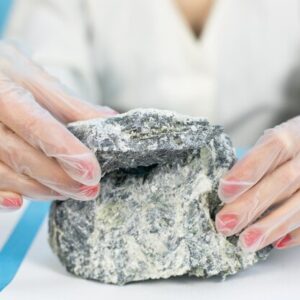Bentonite clay, a naturally occurring mineral derived from volcanic ash, is widely used in the pharmaceutical industry due to its unique chemical composition and beneficial properties.
Composed primarily of montmorillonite, a type of clay mineral, bentonite is known for its high water absorption capacity, swelling ability, and ion exchange properties. These characteristics make it suitable for a range of applications in pharmaceuticals, from tablet formulation to drug delivery and beyond.
1. Use as an Excipient in Tablet Formulation
In pharmaceutical formulations, bentonite is commonly used as an excipient in tablet production. Its properties aid in binding, disintegration, and overall stability of tablets.
Bentonite’s high swelling capacity allows tablets to break apart effectively in the digestive tract, aiding in the rapid release and absorption of active ingredients. Additionally, it serves as a binder to hold the tablet’s ingredients together and provides consistency during manufacturing.
2. Drug Delivery and Controlled Release Systems
Bentonite’s adsorptive properties make it useful for drug delivery systems. Its layered structure and surface charge allow it to adsorb various drug molecules, which can then be gradually released over time. This capability is particularly beneficial for controlled-release formulations, where a steady release of the drug is essential for maintaining therapeutic levels over an extended period.
Bentonite can also enhance the stability of certain drugs, protecting sensitive active ingredients from degradation in the digestive system.
3. Suspending and Thickening Agent
Due to its swelling and thixotropic (gel-forming) properties, bentonite is frequently used as a suspending and thickening agent in liquid and semi-liquid pharmaceutical formulations such as suspensions, gels, and ointments.
When hydrated, bentonite swells, creating a stable colloidal suspension. This is useful in ensuring that active ingredients remain evenly dispersed throughout the formulation, providing consistent dosing and efficacy.
4. Antacid and Adsorbent
Bentonite is also utilized as an antacid and adsorbent in gastrointestinal medications. In its adsorbent role, bentonite can bind to toxins, impurities, and gases within the digestive tract, which may alleviate symptoms of gastrointestinal distress.
Some studies suggest that bentonite may be effective in binding with certain toxins, making it beneficial for patients with specific digestive issues. Its antacid properties help to neutralize excess stomach acid, providing relief from conditions such as heartburn and acid reflux.
5. Wound Healing and Dermatological Applications
In dermatology, bentonite is often incorporated into topical pharmaceutical formulations due to its ability to promote healing and protect the skin. It creates a protective barrier that helps prevent contamination of wounds and other skin lesions.
Its adsorptive capacity also helps draw out impurities and excess oils from the skin, making it valuable in treating acne and other skin conditions. In wound care, bentonite helps in maintaining a moist environment, which is conducive to healing.
6. Allergen Binding and Detoxification
Bentonite’s detoxifying properties are leveraged in pharmaceutical applications aimed at binding and removing allergens, heavy metals, and other unwanted substances from the body. Due to its ability to adsorb and immobilize harmful substances, it is sometimes included in formulations for detoxifying supplements or used as a natural detoxifier.
7. Benefits in Veterinary Medicine
Beyond human pharmaceuticals, bentonite also finds applications in veterinary medicine. It is used to treat gastrointestinal conditions in animals, especially in cases of poisoning, as it can bind to toxins and prevent their absorption in the gut. Additionally, bentonite helps in managing symptoms of diarrhea and other digestive ailments in animals by adsorbing harmful substances and promoting a healthy gut environment.
8. Enhancement of Bioavailability
Another emerging area of bentonite research in pharmaceuticals involves enhancing the bioavailability of drugs. Bentonite, due to its high surface area and adsorption characteristics, may improve the solubility and bioavailability of poorly water-soluble drugs. This can lead to increased drug absorption, allowing for more effective treatments with potentially lower dosages.
Safety and Regulatory Considerations
While bentonite is generally regarded as safe (GRAS) by the FDA for specific applications, there are regulatory standards and quality controls to ensure its purity and suitability for pharmaceutical use. Contaminants such as heavy metals must be carefully controlled, as bentonite from different sources may vary in purity. High-quality, pharmaceutical-grade bentonite is rigorously tested to meet these standards, ensuring safety for consumer use.
Conclusion
Bentonite clay’s versatility and unique physicochemical properties have made it invaluable in pharmaceuticals. From tablet formulation to wound healing and drug delivery, bentonite provides multifunctional benefits that improve product performance, stability, and efficacy. As research into bentonite’s bioavailability enhancement and detoxifying capabilities grows, its applications in the pharmaceutical industry are likely to expand further.






